Ovid 18 The SEALs
- 4 years ago
- 27
- 0

 2 years ago
2 years ago
As usual, this tale is about PG-13, but it is written for adults. Permission, as usual, is granted to any and all to archive. I hope you enjoy it. Ovid VI - The Developer By The Professor It was a perfect Saturday morning in Ovid. The sun was shining with the promise of a warm - but not hot - spring day. The humidity was relatively low for late May, and there was a light breeze from the north which meant I could open up the house and smell the aromas of spring. Jerry was at the...
 2 years ago
2 years ago
Ovid VII The Director By The Professor Copyright (c) The Professor, 1999 You would never expect to find a beach in Oklahoma, would you? Well, Sunset Beach was a pleasant surprise. Of course, it was really situated on a clear blue lake called Lake Pelias, and the sand was all trucked in, but on a hot summer afternoon, it was just the place to be. All the land around the lake was owned by a Brad Nelson. He had trucked in the sand and installed a gravel parking lot. Two dollars...
 4 years ago
4 years ago
Ovid 9 - The Private Eye By The Professor I felt as if I was running a nursery. Court had been in session all morning, and Ovid now had four new children - real children, that is - who needed to be integrated into their new lives. It wouldn't have been so bad if they had all been part of one trial, but the four children were the result of three separate trials. Where four separate men had once been, there were now four children, ranging in ages from six to twelve. Two were boys and...
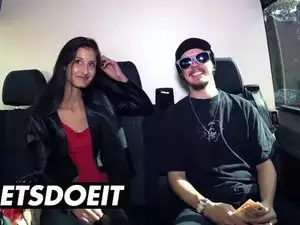 2 years ago
2 years ago
Ovid 19 - The Sleeper By The Professor The call from The Judge on an otherwise quiet Sunday afternoon came as no great surprise, after what had happened on Saturday. I had even arranged for Myra Smithwick to come over and baby sit for me since Jerry was breaking in a new weekend manager at the store. Normally I would have asked Susan to watch them, since her Joshua and my Ashley seemed to really enjoy each other's company, but Susan and her husband were in Kansas City at a Chiefs...
 2 years ago
2 years ago
Ovid 8: The Team By The Professor Part 1 I could remember being frightened before, and I could remember being elated. I was frightened back in high school when in a football game, I was being covered on a pass pattern by a guy who seemed to be twice my size. I thought he would kill me before I could haul in the ball that would win the game for us. Then I remembered the fear wash away as I caught the ball just inside the goal line. Then I was elated. But that was another lifetime...
 3 years ago
3 years ago
This one is PG-13. The usual suspects are free to post this at your sites. Others please ask - permission is freely given. Enjoy- The Professor Ovid 17 The Talking Head By The Professor I breathed a sigh of relief as I saw the sign welcoming us to Ovid just ahead. It was ironic, I supposed, for here I was, one of the favored who could come and go from Ovid as I pleased and yet I always looked forward to returning to the small town which had become my home. I know...
 5 years ago
5 years ago
This is the second story of the Ovid Cycle. As with all the Ovid stories, it contains adult content and should not be read by minors. Permission is hereby given to archive this at any site. Please notify me, though, if you intend to archive it. Return to Ovid: The Lawyer By: The Professor I was up to my eyeballs in work. If somebody had told me a little over a month ago that I would be the secretary to a municipal judge in Oklahoma, I would have snickered at them. If...
 4 years ago
4 years ago
Ovid 20 - The Whiz Kid By The Professor Of all the Gods I had come to know in my time in Ovid, there was only one I had come to actively dislike. Some of the Gods had practically become friends, and one in particular - Diana - had become one of my best friends. Others were more standoffish, indulging human company but actively avoiding it. Some of them could be brusque while others were merely distant. My own boss - The Judge - could be like that at times, although I gave him a bye...
 2 years ago
2 years ago
Ovid 10 - The Academician By The Professor Even when I was male, I always looked forward to spring. I enjoyed watching as the days got longer and the air got warmer. Just watching signs of life returning to the trees and grass was enough to raise my spirits to the stars. As spring began this year, I had something else to look forward to that I would have never imagined when I was male: I would delivery my first baby. Well, as far as the doctor was concerned, it wasn't my first....
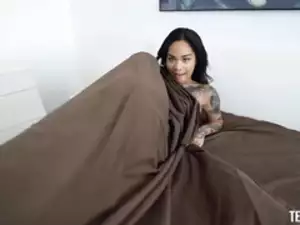 4 years ago
4 years ago
Ovid 15: The Politician By The Professor "I must see The Judge at once!" I looked up from my desk. I had been so involved in what I had been doing that I had not even heard anyone approach. What I saw in front of me was a stern-faced woman, middle-aged with short, black hair. She wore little or no makeup and her clothes were equally plain, consisting of a long black skirt and a gray blouse which did little to hide two oversized, drooping breasts. "I'm sorry," I said primly in my...
 2 years ago
2 years ago
Ovid 16 - The Derelict By The Professor I think the day I really reconciled myself to being a woman was the day I discovered I really did like to shop. Yes, I know, it's a tired old stereotype, but the shopping trips I enjoyed with Susan Jager allowed the two of us to bond as friends and as women. And it didn't hurt that it gave us a few hours unfettered by children. I probably appreciated that time more than Susan since she just had Joshua while I had Ashley and the twins. Susan...
 3 years ago
3 years ago
As usual, this contains adult material. Be 18 or begone. You're welcome to archive at any site. Please notify me, though. Ovid IV: The Bank Robbers By The Professor For the Captain The light breeze that blew up my skirt as I crossed Main Street on my way to Susan's office was almost warm. One pleasant surprise for me in Ovid had been that spring came much earlier to Oklahoma than it did to Indiana. Here it was, only the last week of February, and already the sun had...
 4 years ago
4 years ago
Almost eight weeks ago, I promised a new Ovid in three weeks or so. So what happened? Well, an unexpected illness followed by surgery and a hospital stay slowed me down. Although I was in the hospital for less than a week, I just didn't feel like finishing the latest Ovid tale. Well, I'm fine now, and the story is finally finished. It's the first Ovid story in several months. I try to alternate between an Ovid story and a non-Ovid tale, but after I finished Deity 2, County Fair...
 2 years ago
2 years ago
Ovid 21 - The Answers By The Professor I awoke from an unplanned nap with a start. In spite of the pleasant sounds of an early summer day - the barking of a dog several yards away, the sounds of the sprinkler watering the yard next door, and the muffled sound of a baseball game on TV coming from inside the house where Jerry was watching a KC Royals game, and the soft buzz of a pesky fly - I had awakened in an agitated state. I had been dreaming as I lay on the comfortable chaise...
 4 years ago
4 years ago
Ovid 14 - The Band By The Professor Every now and then, I wonder. I wonder if the gods I work for and with are really gods or something else. I wonder why they created Ovid. I wonder why they transform some people into other people and follow their new lives very closely while others they seem to forget before their victims ever stagger out of the courtroom. I wonder what they know of the future that we mortals can only guess at. But most of all, I wonder: why me? Why was I chosen to...
 3 years ago
3 years ago
Ovid 8 The Team By The Professor Part 6 Danny and I had spent most of the party talking to others and had spent very little time together. Maybe it was my imagination, but I suspected Danny was as uncomfortable being around me as I was being around him. We had been thrust into the role of a dating couple, and there were some real pitfalls to that. It might have been easier if we had barely known each other. If, say Austin Blake had been turned into Danny, it might have been...
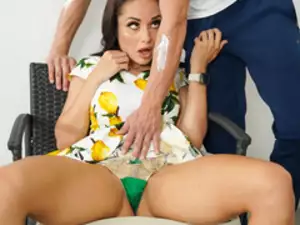 2 years ago
2 years ago
Time to visit Ovid again. As usual, this contains some adult material (maybe PG-13), so use your own discretion. You may archive at any site, but please notify me of your intention to do so. Comments are always appreciated. Ovid III: The Road Crew By The Professor It had grown colder in Ovid through the month of December. The remains of an early December snow were still piled by the side of the streets and a gray sky threatened at least another four inches before evening. I had...
 2 years ago
2 years ago
Indru tamil kama kathaiyil ilamaiyaana magalum pinbu vithavai ammavaiyum eppadi usar seithu matter poten endru ungaluku solugiren. Suvarasiyam athigam irukum kama kathaikul selalam vaarungal, en peyar karthik. En veethiiyil oru pen ilamaiyaaga sexiyaaga irupaal, avalai thinamum sight adithu kondu irupen. Thinamum aval kalluri sendru varum pozhuthu iru velaiyilum sight adika arambithu viduven. Aval peyar nandhini vayathu 21 irukum, avaluku veetil aan thunai kidaiyaathu. Veetil oru amma iru...
 2 years ago
2 years ago
THE TALE OF JET & QUARTZ By: Darian Deamos Chapter Five: Finding Center Wolf looked around and sighed. It had been just over a day, and he was glad of the respite, but he needed to get off of the train before it got to Seattle. It was too bad that the collar kept him from actively betraying anything, or he would have done something here, but even the thought of leaving some blood on the ground had frozen him. He turned and opened the back of the car, and leaned out into the...
 4 years ago
4 years ago
THE TALE OF JET & QUARTZ By: Darian Deamos Chapter Six: Puzzle Box "Ten, Two! "Four, One! "Six, Four! "One, One!" The count rang in her ears, and Quartz moved with speed and vicious strength, striking at the numbered metal plates that ringed her, each blow bringing fourth a series of ringing chimes. Sometimes they matched the first call of the count, and sometimes they didn't. Each failure brought a surge of shame...
 2 years ago
2 years ago
THE TALE OF JET & QUARTZ By: Darian Deamos Chapter two: Live Strong Dan and Sam walked down into their living room, and into a storm. A storm of confetti. There was a big sign up in the rafters, saying 'WELCOME BACK!' and Brian and Diane were standing on either side of the door with noisemakers, blowing them into the twins' ears. If they could have, they would have blushed. "Um, thanks?" Sam muttered, feeling suddenly and unaccountably self- conscious. If she could have...
 1 year ago
1 year ago
Note : This story is completely fictional!In nineteen forty six Thelma Lou Anderson was married with three kids. Linda was the oldest. She was sixteen. Guy and George was ten and Guy seven. Thelma owned a beauty shop in Kansas City. She suspected her husband Lawerance was cheating on her again. She followed him one day when he thought she was at work and saw him go into a house. A woman opened the door and he went in. That was all the proof she needed. She went home and packed her suitcase and...
Incest 4 years ago
4 years ago
THE TALE OF JET AND QUARTZ By: Darian Deamos Chapter Four: Blowing Town Sergeant Malcolm Stark was in a rather lot of pain. It has been several hours since the Carmichael twins had left. He was convinced now. The two of them had to have been the twins, not some kidnapping terrorists. What a load of bull. With something like two hours of observation, he knew that, and he was just a grunt. Well, maybe not just a grunt. You didn't get the kind of position he held if you were just...
 3 years ago
3 years ago
THE TALE OF JET & QUARTZ By: Darian Deamos Chapter three: Going Postal Quartz was sleeping peacefully. Then there was a loud pop from directly in front of her and a splitting pain between her eyes brought her raging out of her dreams and into wakefulness. Her head was pressed down into her pillow, and there was a splitting pain between her eyes. When she opened her eyes, she saw the smoking barrel of a gun not 4 inches from her face. Without really thinking she reached out and...
 2 years ago
2 years ago
Jethalal apne bedroom mein soya hai raat ko, thakaan se chur ho ke. Lekin us ko neend nahi aa rahi. Awaazein aa rahi hai. Dabi-dabi aur thami-thami, par neend ko pareshaan kar jaane waali. Jetha Bhai lambi saans lete hue, chidh-chidha muh kar, apna haath apne bistar ke daeyin aur pe ghumata hai. Apni patni Daya ko jaga ne ke liye. Jetha: Uff! Yeh awaz kahan se aa rahi hai? Daya zara dekho— Jetha apna haath Daya ko uthane ke liye badhata hai apne bistar pe. Par us ko sirf chaddar haath mein...
 3 years ago
3 years ago
Mother Ethel always enjoyed the short walk to the train station. It was beautiful Autumnal morning and Mother Ethel took the opportunity to walk to the train station as she knew that she had a very busy day ahead. Those that saw Mother Ethel along the way bowed reverently,they knew that Mother Ethel was a Nun of the Monastery of Repentance and when a Nun or a Monk walked past it was polite to bow, for many knew what the Nun's and Monk's of the Monastery were capable of. As Mother Ethel strolled...
 3 years ago
3 years ago
Note: I am assuming that you all know the characters of taarak mehta ka ooltah chashmah.If not please check it out on google. ->>Part 1=Madhvi-bhide and sonu ka bada kaand!!! Toh story kuch aise start hoti hai, Subah ka samay tha gokuldham soicety mein aur lagbhag 5:30 hua the aur bhide ke ghar mein hamare maananiya Shikshak mahoday apni pyari madhu(He calls madhvi as madhu in love) ko thoke ja rahe the. Morning sex ka luft utha rahe the.Aur madhvi ko bhide ke 9inch ke lund se bohot jyada dard...
 4 years ago
4 years ago
This is a incident between Babita ji aur Jethalal when Daya went to Ahmedabad. Baarish ka mausam tha. Jethalal baarish mein bhigte hue ghar jaa raha tha. Tab raaste mein auto mein usse Babita ji ne dekh liya. Aur Jethalal ko apne saath auto mein bitha liya. Dono Gokuldham pahuchte hai tab Jethalal ko yaad aaya ki woh apne ghar ki key dukan mein bhool gaya. Bapuji aur Tapu kutch gaye hue the. Babita ji Jethalal ko unke saath ghar aane ko bolti hai. Iyer bhi koi meeting ke liye Delhi gaya hua...
 1 year ago
1 year ago
mein Daya aur Bagha ki chudai dekh kar Anjali garam ho gayi thi. Woh apni chut sehla rahi thi. Tabhi Tapu waha aa gaya, aur usne Anjali ki haalat ka faida utha kar usko chod dala. Fir chudai ke baad Daya aur Bagha apni seats par aake baith gaye. Uske kuch der baad Tapu aur Anjali bhi apni seats par aake baith gaye. Ab aage chalte hai. Ab station aa chuka tha. Jethalal aur Madhavi bhi sab ke paas aa chuke the. Ab sab baatein kar rahe the, aur har koi kuch na kuch khaa raha tha. Tabhi waha ek...
 3 years ago
3 years ago
To baat us din ki hai jab Gokuldham society ki sari families ne Goa jaane ka decide kiya. Sab ki train ki tickets book ho chuki thi, aur sab taiyaar hoke gaadiyon mein baith gaye. Jethalal ko achanak phone aaya ki uska koi important client uski wait kar raha tha. Client bohut important tha, aur agar Jethalal usko nahi milta, to uska kafi nuksaan ho jata. Isliye usne Daya ko bola ki woh baaki sab ke sath chali jaye, aur Jethalal usko seedhe station par milega. Ye bol kar usne gaadi pakdi, aur...
 2 years ago
2 years ago
Dot, Dorothea, and Dick Chapter One Dear sister: I found this letter among some others, scrolled up and tied with purple ribbon, in a chest belonging to our great grandfather. The name Charles has belonged to several in our family line, but I believe I know the one who received and saved this letter, and kept it preserved for so many years. I believe the letter speaks for itself, so I will now offer it up to you. Dearest Charles: I hope this missive finds you in such good...
 4 years ago
4 years ago
Hello friends this is Humraaj back with next episode of Tmkoc series. Thank you all for giving so much of a positive reponse to this series and please do check my other stories of . If any one want to contact from and around Ahmedabad please mail me on Now let’s start the episode. Jaisa ki aap jante hai Babitaji Anjali bhabi ko Jethalal ke lund ke bare mein batati hai. Par Anjali thoda doubt mein hoti hai ki Jetha bhai ke sath kaise? A: Babitaji ek taraf to daar lag raha hai ki Jetha bhai ne...
 2 years ago
2 years ago
Hello dosto. Meena again… Part 1 se aage yaha shuru karti hu. Part 1 me aapne padha ki kaise mene apne jeth ji ka lund dekha aur kaise mene anjaan ban ke unko apne boobs dikhaye… Ab aagey – mujhe malum tha ki jeth ji jarur plan bana rahe honge ki mujhe kese hasil kiya jaye, par wo plan kya tha ye mujhe nhi malum.. Mujhe intazar karna tha mouke ka. Ek din ki baat hai. Sunday tha. Sab ghar me thay. Pati ke sath main 1st floor par thi… Dopahar ko jeth jethani ko lunch khilana tha. Mene pati se...
 4 years ago
4 years ago
Hi,guys mera name tarun kumar hai. Main meerut se belong karta hu.dosto main indiansexstory ka bahut bada fan hu,main pichle 5 salo se indiansex story read kar raha hu.aaj main apke samne ek story suna raha hu, dosto meri kahani kewal manoranjan ke liye hai.ye ek kalpnik kahani hai phir bhi is tahar likhi hai ki apko real lage.dosto ye meri pahli kahani hai to kuch mistake ho jaye to maaf kar dena.ab apko born a karte hue main apni story ki taraf badtha hu.to dosto meri kahani ka nayak jethalal...
 2 years ago
2 years ago
Our Last Day of School. I can’t believe it. This is my last day of school, I thought, not sure how I felt now that the long awaited day was here. Stepping out into the beautiful sunny afternoon, heading toward the group of waiting yellow school buses I breathed a sigh of relief. I was glad school was finished. Throughout High School like a ship at sea, I had plotted my course, studying hard. However, the Scholarship that many felt I had rightfully won had somehow ended up going to one of...
 2 years ago
2 years ago
“What’s wrong? What’s wrong?”Anthea looked up at her mum as she sat down at the dining table. “Nothing is wrong,” Anthea responded watching as her mum hurriedly dried her hands with a tea towel.“Is the baby okay? Are you okay? Is Jack okay?” she asked as her husband came into the room and pulled up a seat at the table.“We’re all fine Mum,” she responded exasperated with her mum’s anxiety. “I have something to tell you.”“Sit down Helen,” her dad snapped. “Give the lass a chance to speak.”Anthea...
 4 years ago
4 years ago
Hi mera naam Nikita Sing hai aaj main iss ke dwara apani real story likh rahi hu mera naam nikita sing hai main ek married woman hu, aur meri 3 saal ki ladaki hai mera rang gora aur body slim hai mera figar 34 28 38 hai meri join the family hai mere saas sasur aur bade jeth aur unki biwi aur do bachhe aur main mere pati aur meri ladki. main ek pvt co. main kaam karti hu ek din mere jeth ji ka birthday tha. so maine office se unhe birthday wish karne ke liye phone kiya. Main: hello wishes you...
 3 years ago
3 years ago
Hello, all my name is SD. I’m writing my first story about this series. I need not give an introduction to each character as everyone knows it. I am coming to the story as it happened. As all of you know, this is a work of fiction and for fun. Almost everyone knows that our main character Jethalal has a huge crush on Babita Iyer. He has been trying so many days to get between her legs but is not successful. Thanks to her strict husband, Iyer, who thwarted every plan. But very few know that Iyer...
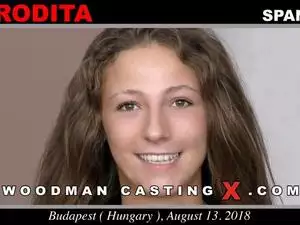 3 years ago
3 years ago
My Golden Summer with Blythe – Part 2 Josh’s childhood dream girl visits him in San Francisco. The Return of Blythe Coming from a small farming community, San Francisco proved to be everything Josh had ever imagined – and then some. He loved the freewheeling atmosphere – the friendliness – in short, he fell in love with the city by the Bay. Because of early retirements, and dedication to his work, he had advanced much quicker than he had ever expected. Arriving at his chic little Apartment...
 4 years ago
4 years ago
Toh guys,I hope aapko meri story “jetha aur madhvi ki jabardast chudai”, bohot pasand aayi hai.Agar aisa hai toh plz use like kare aur comments bhi kare,mein wait karunga aapki comments ka.Aur agar koi suggestions hai toh aap mujhe mere “” account mein mail kare.I will eagarly write a story on that. So story start karte hai. Toh hua kuch aisa ki ek baar jab jethalal jab 23 saal ka tha toh woh apne dosto ke saath shimla gumne gaya tha aur waha use woh mili jiska naam tha “Gulabo” .Naam hi itna...
 4 years ago
4 years ago
Uther By Ellie Dauber (c) 2006 Introduction According to the legends of King Arthur, Merlin changed Uther Pendragon into a double for Duke Gorlois, so he could spend the night with Ygraine, the Duke's wife. Ygraine and Gorlois had three daughters: Elaine, Morgause, and Morgan le Faye. During their time together, Ygraine became pregnant with the child who was to become King Arthur. Uther's men killed Gorlois that same night. This is my TG (of course) version of what...
 3 years ago
3 years ago
Chapter 11: Althea, the School Girl The infernal screeching of the alarm clock awoke Cal from his reverie. He had been up for about a half-hour, but he had only been lying in bed next to the love of his life. Althea's arms were still clutched about him as he stealthily clicked the snooze button, assuming that it was six o' five in the morning, his usual waking time during the school week. He had been thinking long and hard about the previous two nights. Evan... what have you become? He...
 3 years ago
3 years ago
It’s a bright sunny day in June. I am done with classes and I plan on spending it on the lake riding my jet ski.I am feeling a bit naughty today, so I decided to put one of my butt plugs in before I dress. I also put some toys in my bag. It’s an eight-inch vibrating dildo, pink in color. I can already feel the wetness in my bare pussy. I put a six-inch dildo with a suction cup in there as well.Putting on a two-piece purple bikini that barely covers me. I wonder to myself if I could get by with...
Masturbation 4 years ago
4 years ago
edited by Master Ken Wednesday, September 4th, 2013 "Hi, I am Miss Blythe," I said to my class, writing my name on the whiteboard with a red dry-erase marker. "I will be your World History teacher." It was the first day of the new school year and, as I launched into the course syllabus, my thoughts kept drifting to that day in June at the end of the last term, when my Living God, the Holy Mark Glassner, walked into this very classroom and changed my very outlook on life. I didn't know...
 3 years ago
3 years ago
The the wind howled around the quayside as I stepped onto terra firma for the first time in weeks, the wind threw sharp shards of ice to sting our faces as we looked up at the sails as they were finally furled and stowed as our captain grinned at our discomfiture, "Au revoir!" he joked as if he knew we should soon be recalled. Those such as were left, and we were few enough, I shuddered. My best uniform packed securely in my Valise, awaited me, and just a few more duties before I...
 3 years ago
3 years ago
Hi. Love pirate here. This is my first story on ISS. Its a series based on pretty famous TV. Show, Tarak Mehta Ka Oolta Chashma. If any girl in Chandigarh aur Panchkula wants real enjoyment or only friendship can reach me out on my gmail: . Also please do not forget to comment on the story.You can also give me your feedback on the above stated email. Now let me begin my story. Most of you would be knowing about the society and the characters, so I am skipping that part. The rest of the story...
 2 years ago
2 years ago
As he approached one of the hall's long mirrors he stopped to inspect himself. It was a familiar sight, the flowing, billowy French maid outfit surrounding his body. His arms and legs were outlined in silky, white stockings and arm-gloves. He wore pearl earrings and the lacy white collar around his neck was adorned with a beautiful pendant. It was a gift from mother that he wore every day, without fail. Jon's painted red lips and neatly applied eyeliner and blush were evidence that he was...
 2 years ago
2 years ago
PREFACE:There are no sex acts in the story but the patient does have an orgasm as a result of the Ther****t’s physical examination. Part 1 is the Sex Therapy appointment from the patient’s point of view and part 2 is the same examination seen through the eyes of the Ther****t. I don’t think it matters which one you read first.I hope you enjoy it and will let me know what you think in any...
 2 years ago
2 years ago
Katherine stepped into her elegant living room and took a book from the shelf. She sat in a plush lounge chair, specifically selecting a chair in the back corner of the room next to an old dumbwaiter that was once used to ferry delicious meals from the downstairs kitchen to the dining room table. She planned to read the book for a short while, but she already knew her attention would soon be diverted. Tonight the dumbwaiter would once again be placed into service, except this time it would be...
 1 year ago
1 year ago
Do you know of the porn site Motherless.com? You should. I’ve reviewed it a few times on my site, The Porn Dude, although it was for different genres every time. This time around, I’m going back to this place and looking at a specific and niche little category many of you are just begging me to cover. We’re looking at vintage porn today. While it doesn’t have the same resolution and quality as the porn you can find today, it’s definitely a genre of porn that has a lot of personality to it and...
Vintage Porn Sites 3 years ago
3 years ago
I should have known better. I should have remembered that old saying, "If it looks too good to be true, it is." I was in love. She was damned near all I thought about with the exception of my studies and it didn't make sense to me. I prided myself on my intellect and my ability to think logically, but there wasn't anything logical about the way I felt about Althea. She was beautiful, smart and very popular and I was not. I wasn't a bed looking guy, but I was nothing exceptional. I was...
 2 years ago
2 years ago
I spent the second semester of my freshman year in college in an exchange program in Germany. I got along well with everyone, particularly the girls in my class, who would go together as a group to a spa that had a nice, heated pool that was nice to swim in, particularly during the cold months of the winter. I had been to the pool several times with them, and this time didn't seem any different than the previous ones at first. It was around closing time, and I saw a girl from my class, a German...
Masturbation 1 year ago
1 year ago
Motherless. A one-word website title that says everything it needs to say. This is a site where the rules are, more or less, completely thrown out the window, morality means absolutely nothing, and there is nobody to save you from it. Hedonism is God here.The site likely is also called this due to the fact that the girls who end up on motherless.com likely have no positive female influence in their lives to keep them from it. Motherless is the place parents spend their whole lives fearing that...
Porn Pictures Sites 1 year ago
1 year ago
I always considered Motherless the “4chan” of porn. Not only because Motherless was somewhat popularized there, but because Motherless also encourages users to share their own content in a very open way. This means minimal bullshit like moderation and censorship, and a strong “anything goes” attitude that leads to free and extreme content. It encourages people to create and upload their own homegrown content, like videos of their girlfriend pissing or spycam videos of their cousin....
Amateur Porn Sites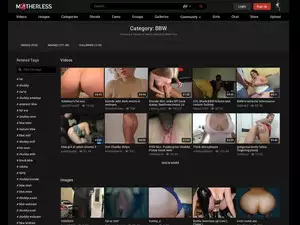 1 year ago
1 year ago
What is it about Motherless that makes me fucking cum every time? Maybe it is how raw and amateur the porn on the site comes across as, or the content is just that fucking hot. Perhaps it is the fact that there is an astronomical amount of pornography just waiting for a dumb fuck like you to beat off to! I really don’t know, and frankly, I’m not going to pretend that I do.But what I do know is that if you love BBWs, the Motherless.com homepage will not be of much use! Preferably, head on over...
BBW Porn Sites 1 year ago
1 year ago
Have you ever heard about a website called Motherless? Home to all kinds of kinky porn niches, with a side of the mainstream crap? If you are into some questionable fap content, you might want to check this website out. Plus, Motherless is a free porn website, so you can browse as much as you fucking want. Now, I am not really here to talk about the website in general… I am here to tell you about their amazing category, called voyeur porn.The world of voyeur fucking is a rather interesting one....
Voyeur Porn Sites 2 years ago
2 years ago
Clothesline[This story is part of the Leather in Lawnville series.] Clothesline By DuskPetersonYou can tell a lot about a guy from where he shops. Take my friends, who have specialized tastes. Some of them spend their time at the hardware store, while others take an interest in our town's fabric shop, which has needles and pins that make them drool. Still others hang out at the department store, eyeing the cutlery collection. Somehow all of us end up rubbing shoulders at the town's jacket...
 3 years ago
3 years ago
The Five Kingdoms of Arstoria had been embroiled in the Great Ancient War for centuries. The war came to an end when Kalace, the Wizard King conquered the five lands and brought them under his rule. Kalace, the Wizard King of Arstoria, conquered all of his opponents who were unable to deal with his overpowering magic. When Kalace had united the five kingdoms, he brought peace to the warring kingdoms and was revered and celebrated by his later generation. Kalace, however, had a dark weakness in...
Fantasy